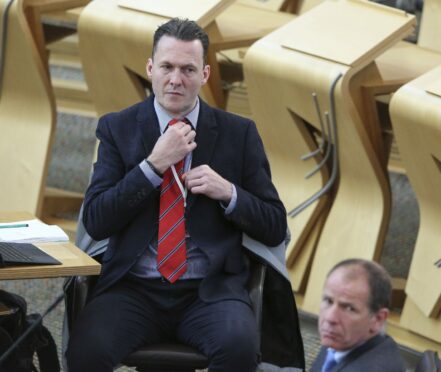The Scottish police force has problems with sexism and racism, according to a Conservative MSP.
Following former Metropolitan police officer Wayne Couzens being sentenced to life in prison for the kidnap, rape and murder of Sarah Everard, concerns about sexism and allegations about officers using their status for exploitation have been raised.
There have also been accusations female police officers had been bullied in “thoroughly unpleasant ways”.
‘Canteen culture’ of racism and sexism
Russell Findlay, the Scottish Conservatives’ deputy spokesman on community safety, said there are “serious issues” beyond the Met.
However, he also said it would be “alarmist” to go as far as saying women should feel unsafe on Scotland’s streets when it comes to the police.
He was asked in a radio interview if police in Scotland are institutionally misogynistic.
Mr Findlay replied to say: “Yes is the short answer.
“It is a serious issue and it is not just a Metropolitan Police problem.”
He said: “That is not just me saying that, and it is police officers from constables to senior ranks.
“The former lord advocate described a canteen culture existing with racism and sexism.
“What I have seen over the years is a whole range of issues from the extremely serious such as police officers convicted of rape using their uniform and status to perpetrate these crimes, right down to a culture where female police officers are bullied in thoroughly unpleasant ways.”
I have seen issues from the extremely serious such as police officers convicted of rape using their uniform and status to perpetrate these crimes.
– Russell Findlay MSP
Mr Findlay, a former journalist, added: “When someone blows the whistle far too often they are suppressed.”
Claims of bullying and a misogynistic culture come after it was revealed police spent more than £220,000 in two years on “gagging orders”.
It was alleged they were imposed to silence women on complaints involving Police Scotland.
Three female officers, three civilian staff and one member of the public all received pay-outs after signing non-disclosure agreements, it was reported by The Scottish Sun.
Call to introduce victim’s law to Scotland
Mr Findlay’s comments were made as he discussed promises to introduce a victim’s law to the Scottish criminal justice system, as well as what campaigners are calling Suzanne’s Law and Michelle’s Law.
Mr Findlay, BBC Radio Scotland, added: “It is a pretty short name, but it encompasses a huge amount of comprehensive and ambitious reforms.
“It will put victims at the heart of the criminal justice system.
“For far too long these peripheral voices have not been heard and it is important they are.”
He described the aims of Michele’s Law, named after teenager Michelle Stewart who was murdered in 2008.
“Fundamentally it would give victims and their families the right to be heard during the parole process,” he said.
“And Suzanne’s Law, named after murder victim Suzanne Pilley, which would prevent the release of killers unless they disclose where the remains of the person they have killed are.”
Police ‘working with government’
Deputy Chief Constable Fiona Taylor, from Police Scotland, said: “Sexism and discrimination of any kind is deplorable and unacceptable.
“It has no place in society and no place in policing.”
In a statement, she highlighted a review by Dame Elish Angiolini which set out the challenges facing police.
“Values based policing, which reflects and represents our communities is vital to the public confidence and consent from which policing draws its legitimacy,” she added.
“That bond of trust is maintained and enhanced by our commitment to improving standards where we can do better.
“Police Scotland demands the highest levels of integrity from our officers and staff and when someone fails to meet this standard we take the appropriate action without delay.”
Progress has been made but there is “work to do”, DCC Taylor said.

